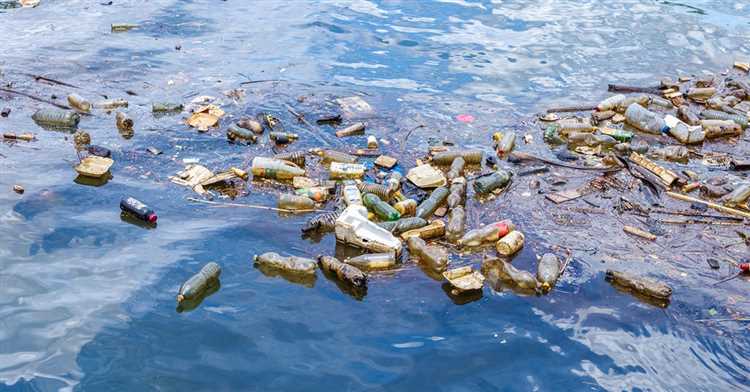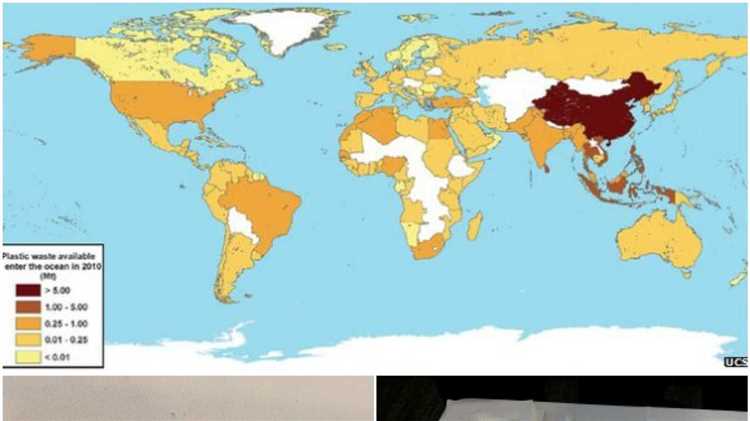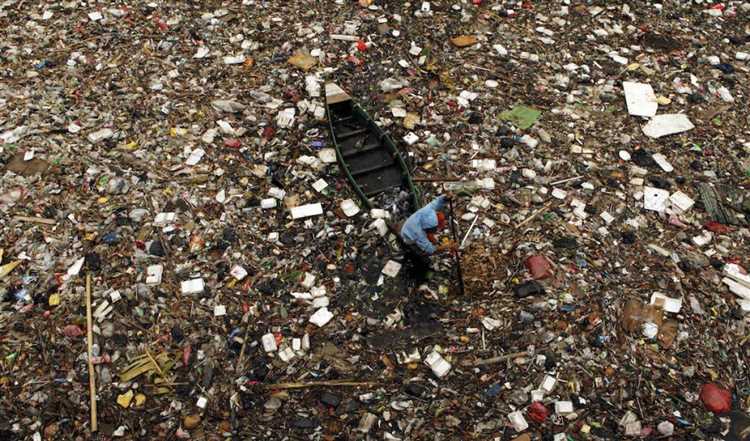
Ocean pollution is a global issue that poses a serious threat to marine life and ecosystems. One of the major contributors to this pollution is the improper disposal of garbage, which often ends up in the oceans. While many countries around the world are working towards reducing their waste and implementing recycling programs, there are some countries that are notorious for their contribution to ocean pollution.
China is often identified as the largest contributor to ocean pollution with garbage. This is due to its large population and rapid economic growth, which has led to increased consumption and waste generation. According to a report by the Ocean Cleanup Foundation, China alone is responsible for approximately 27% of the global mismanaged plastic waste that enters the ocean.
Another country that is responsible for a significant amount of ocean pollution with garbage is Indonesia. With its extensive coastline and lack of waste management infrastructure, Indonesia is one of the top countries that contribute to marine plastic pollution. The country has been struggling to manage its waste and prevent it from ending up in the ocean, leading to devastating consequences for its marine life.
The United States is also among the countries responsible for ocean pollution with garbage. While the country has implemented waste management and recycling programs, a significant amount of plastic waste still finds its way into the ocean. According to the same report by the Ocean Cleanup Foundation, the United States is responsible for approximately 14% of the global mismanaged plastic waste.
In conclusion, addressing the issue of ocean pollution with garbage requires a global effort. It is crucial for countries around the world to prioritize waste management and recycling, in order to prevent further harm to our oceans and marine life. By implementing effective strategies and working together, we can make a significant difference and protect our precious marine ecosystems for future generations.
- The Main Countries Responsible for Ocean Pollution with Garbage
- China
- Indonesia
- United States
- United States and Plastic Waste
- Consumer Culture
- Inadequate Waste Management
- China and Marine Litter
- Plastic Pollution
- Fishing Gear and Ghost Nets
- Indonesia and River Disposal
- Vietnam and Plastic Bag Pollution
- Excessive Use of plastic bags
- Improper Disposal
- Environmental Impact
- Thailand and Mismanaged Waste
- Waste Management Issues
- Impact on the Ocean
- Philippines and Coastal Waste
- Plastic Pollution
- Impact on Marine Life and Ecosystems
- Efforts to Address the Issue
- Q&A:
- Which countries contribute the most to ocean pollution with garbage?
- What are the consequences of ocean pollution with garbage?
- How can we reduce ocean pollution with garbage?
- What are some initiatives and projects aimed at tackling ocean pollution with garbage?
The Main Countries Responsible for Ocean Pollution with Garbage
Ocean pollution caused by garbage is a significant environmental issue that affects marine life and ecosystems worldwide. While many countries contribute to this problem, some are more responsible than others. This article will highlight some of the main countries responsible for ocean pollution with garbage.
China
China is often considered one of the biggest contributors to ocean pollution with garbage. The country’s rapid industrialization and large population have led to increased production and consumption, resulting in significant amounts of waste entering rivers and eventually, the ocean. Plastic waste, industrial pollutants, and improperly managed waste disposal systems are some of the key factors contributing to China’s impact on ocean pollution.
Indonesia

Indonesia is another country that faces significant challenges when it comes to ocean pollution with garbage. The nation is composed of thousands of islands, which complicates waste management and disposal. Insufficient waste infrastructure and lack of public awareness about proper waste disposal lead to significant amounts of garbage being dumped into rivers and ultimately ending up in the ocean.
United States
The United States is one of the largest consumers of plastic and packaging materials globally. While the country has regulations regarding waste management, a significant amount of plastic waste still ends up in the ocean due to inadequate recycling infrastructure and littering. Coastal areas and densely populated regions are particularly prone to contributing to ocean pollution with garbage in the United States.
These are just a few examples of the main countries responsible for ocean pollution with garbage. Ocean pollution is a global issue that requires collective efforts from all countries to address effectively. Implementing proper waste management systems, raising awareness, and encouraging sustainable practices are essential steps towards reducing ocean pollution and preserving the health of our oceans.
| Country | Reason for Pollution |
|---|---|
| China | Rapid industrialization and large population leading to increased waste production and improper waste disposal. |
| Indonesia | Insufficient waste infrastructure and lack of public awareness about proper waste disposal. |
| United States | Inadequate recycling infrastructure and littering, especially in coastal areas and densely populated regions. |
United States and Plastic Waste
The United States is one of the leading contributors to ocean pollution with plastic waste. Its large population, high consumption rates, and inadequate waste management systems have resulted in significant amounts of plastic garbage ending up in the oceans.
Consumer Culture
One of the main reasons for the United States’ contribution to plastic waste is its consumer culture. The country has a culture of convenience, which has led to an enormous production and consumption of single-use plastic items such as bottles, bags, and packaging materials.
The widespread use of these items, coupled with a lack of proper recycling infrastructure and public awareness, has resulted in a significant amount of plastic waste being discarded and ultimately finding its way into the oceans.
Inadequate Waste Management
The United States also struggles with inadequate waste management, further exacerbating its plastic waste problem. Many regions in the country do not have sufficient recycling facilities or efficient waste collection systems in place.
In some cases, recycling programs are available, but insufficient public education and awareness lead to low participation rates. As a result, a significant amount of plastic waste that could be recycled ends up in landfills or, worse, in waterways that eventually flow into the oceans.
Furthermore, illegal dumping and littering are prevalent issues in certain areas, further contributing to the problem of plastic waste pollution in the oceans.
The United States has taken steps towards addressing these issues by implementing regulations on single-use plastics, promoting recycling initiatives, and funding research for sustainable alternatives. However, more effort is needed to effectively reduce the country’s contribution to ocean pollution with plastic waste.
China and Marine Litter
China is one of the countries that contribute significantly to ocean pollution with garbage, specifically marine litter. With its large population and booming economy, China generates a considerable amount of waste that often ends up in the ocean.
The main sources of marine litter in China include plastic bottles, packaging materials, fishing gear, and other single-use plastics. These items are often discarded improperly, making their way into rivers and eventually flowing into the ocean.
Plastic Pollution

Plastic pollution is a major concern in China, with the country being one of the largest producers and consumers of plastic products in the world. The improper disposal and inadequate waste management systems contribute to the high levels of plastic pollution in rivers and coastal areas.
In recent years, China has recognized the issue and taken steps to address it. The government has implemented policies to reduce single-use plastics and promote recycling. However, the sheer scale of plastic consumption and waste generation in China makes it challenging to tackle the problem completely.
Fishing Gear and Ghost Nets
Another significant source of marine litter in China is fishing gear, including nets, lines, and traps. Abandoned or lost fishing gear, commonly known as ghost nets, continue to entangle marine animals and contribute to plastic pollution in the ocean.
China has started initiatives to tackle ghost nets and improve fishing gear management. These initiatives include stricter regulations and education programs for fishermen to reduce the number of ghost nets in the ocean.
Despite these efforts, the problem of marine litter in China remains significant. International collaboration and continued efforts are crucial to effectively address this issue and protect the marine environment.
Indonesia and River Disposal
Indonesia, as the world’s fourth most populous country, is facing significant challenges in managing its waste. One of the major contributors to ocean pollution with garbage is the improper disposal of waste through its rivers.
With over 17,000 islands and numerous rivers, Indonesia faces difficulties in implementing effective waste management systems across the country. Many communities rely on rivers as a convenient way to dispose of their waste, often without proper treatment or recycling processes in place.
The accumulation of garbage in Indonesia’s rivers eventually leads to it being carried out to the open sea, polluting coastal areas and marine habitats. The plastics, debris, and other waste materials pose a significant threat to marine life, leading to the destruction of coral reefs and the death of various marine species.
The Indonesian government has recognized the urgent need to address this issue and has implemented various measures to tackle river pollution. There are ongoing efforts to improve waste management infrastructure, promote recycling practices, and raise public awareness about the importance of responsible waste disposal.
Nonetheless, the scale of the challenge remains significant, requiring continued efforts and collaboration between government agencies, local communities, and stakeholders. By focusing on better waste management practices and implementing stricter regulations, Indonesia can reduce its contribution to ocean pollution and protect its valuable marine ecosystems.
Vietnam and Plastic Bag Pollution
Vietnam is one of the countries that is responsible for ocean pollution with plastic bags. The excessive use and improper disposal of plastic bags have led to a significant environmental issue in the country.
Excessive Use of plastic bags
Plastic bags are widely used in Vietnam for various purposes, including carrying groceries, packaging, and storage. Due to their convenience and affordability, people tend to use them excessively, leading to a massive accumulation of plastic waste.
Improper Disposal
The improper disposal of plastic bags is another major contributor to ocean pollution in Vietnam. Many people discard their used plastic bags in rivers, canals, and other water bodies, which eventually make their way into the ocean.
Vietnam’s inadequate waste management system also plays a significant role in plastic bag pollution. The country struggles to manage its waste effectively, leading to the accumulation of plastic bags in landfill sites and natural environments.
Environmental Impact
The plastic bags that end up in the ocean pose a severe threat to marine life. Marine animals often mistake plastic bags for food and can suffer from ingestion or entanglement, leading to injury or death. Moreover, the decomposition of plastic bags releases toxic chemicals, further polluting the water and threatening marine ecosystems.
To address the issue of plastic bag pollution, Vietnam has taken some measures, including banning lightweight plastic bags in some cities and promoting the use of eco-friendly alternatives. However, more efforts are needed to tackle this ongoing environmental problem.
Overall, Vietnam needs to continue implementing stricter regulations and promoting awareness among its citizens to reduce plastic bag usage and enhance waste management practices to protect its marine environment from further pollution.
Thailand and Mismanaged Waste
Thailand is one of the countries that is responsible for ocean pollution with garbage. The country has been facing significant challenges in managing its waste effectively, which has led to a substantial amount of plastic and other waste materials ending up in the ocean.
Waste Management Issues
Thailand faces various issues when it comes to waste management. One of the main challenges is the lack of proper waste collection and disposal systems. Many areas in the country, especially rural areas and coastal regions, lack adequate infrastructure for waste management.
In addition, the rapid growth of tourism in Thailand has also contributed to the increase in waste generation. Tourist hotspots often lack proper waste management facilities to handle the large amounts of waste generated by visitors.
Impact on the Ocean
The mismanaged waste in Thailand has a significant impact on the ocean ecosystem. Plastic waste, in particular, poses a severe threat to marine life. Marine animals can mistake plastic for food, leading to ingestion and entanglement. This can result in injury or even death for marine creatures.
Furthermore, the accumulation of waste in the ocean contributes to the formation of garbage patches, such as the Great Pacific Garbage Patch. These patches consist of floating garbage, including plastic, and have a detrimental impact on marine life and ecosystems.
- The pollution also affects the coastal communities that rely on fishing and tourism for their livelihoods.
- Contaminated water and damaged habitats can lead to reduced fish populations and lower tourism revenues.
- Efforts to clean up the ocean and improve waste management systems in Thailand are crucial to mitigating the impact of mismanaged waste.
Thailand has recognized the importance of addressing its waste management issues and has taken steps towards improving the situation. However, further efforts and international cooperation are needed to effectively tackle the problem of ocean pollution with garbage.
Philippines and Coastal Waste
The Philippines is one of the countries that is heavily responsible for ocean pollution with garbage. The archipelagic nation is known for its beautiful beaches, but unfortunately, it also faces a significant challenge in dealing with coastal waste.
Plastic Pollution
Plastic pollution is a major problem in the Philippines, with millions of plastic items ending up in the oceans every year. A study by the Ocean Conservancy ranked the country as the third-largest contributor to plastic pollution in the world.
One of the main factors contributing to plastic pollution in the Philippines is the significant use of single-use plastics. These include plastic bags, bottles, and food containers that are discarded after one use. The weak waste management system in many parts of the country exacerbates the problem.
Impact on Marine Life and Ecosystems
The coastal waste in the Philippines has a devastating impact on marine life and ecosystems. Marine animals often mistake plastic debris for food and end up ingesting it, leading to suffocation, starvation, and other health issues. Additionally, plastic waste can entangle marine animals, causing injuries or death.
The pollution also damages coral reefs, which are vital for the country’s tourism industry and marine biodiversity. Plastic debris can smother and kill coral, preventing their growth and recovery. This loss of coral reefs has a ripple effect on the entire ecosystem, impacting fish populations and disrupting the balance of marine life.
Moreover, the decomposition of plastic waste releases harmful chemicals into the water, further polluting the marine environment and threatening the health of marine organisms.
Efforts to Address the Issue
The Philippine government and various organizations have recognized the urgency of tackling the coastal waste problem and are taking steps to address it.
- The Ecological Solid Waste Management Act of 2000 was passed to promote waste reduction and recycling.
- Community clean-up drives and awareness campaigns are being conducted to educate the public about the proper disposal of waste.
- Non-governmental organizations are working on initiatives such as beach clean-ups, recycling projects, and the promotion of sustainable alternatives to single-use plastics.
- The government has instituted a ban on single-use plastic bags in some cities and is considering implementing it nationwide.
While progress is being made, there is still a long way to go in effectively tackling coastal waste in the Philippines. Cooperation between the government, private sector, and citizens is crucial in creating a sustainable solution to this pressing issue.
Q&A:
Which countries contribute the most to ocean pollution with garbage?
The countries that contribute the most to ocean pollution with garbage are China, Indonesia, Philippines, Vietnam, and Thailand. These countries have high populations and limited waste management infrastructure, leading to a significant amount of waste being improperly disposed of and eventually ending up in the ocean.
What are the consequences of ocean pollution with garbage?
Ocean pollution with garbage has severe consequences for marine life and ecosystems. Marine animals can get entangled in or ingest plastic waste, leading to injury or death. The pollution also affects the water quality and can harm coral reefs and other marine habitats. Additionally, the presence of garbage in the ocean can impact the livelihoods of communities that rely on fishing and tourism.
How can we reduce ocean pollution with garbage?
To reduce ocean pollution with garbage, it is necessary to implement proper waste management practices. This includes improving waste collection and disposal systems, promoting recycling and composting, and reducing the use of single-use plastics. Education and awareness campaigns can also play a role in changing consumer behavior and reducing littering. International cooperation and agreements are crucial to address the issue on a global scale.
What are some initiatives and projects aimed at tackling ocean pollution with garbage?
Several initiatives and projects have been launched to tackle ocean pollution with garbage. For example, the Ocean Cleanup project is working on developing advanced technologies to remove plastic waste from the ocean. The Clean Seas campaign by the United Nations Environment Programme aims to mobilize governments, businesses, and individuals to reduce marine litter. Various beach cleanups and community initiatives are also being organized worldwide to raise awareness and clean up coastal areas.